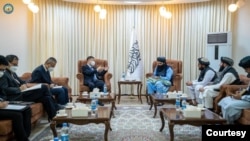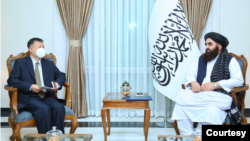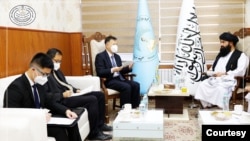Among a small number of ambassadors who remain in Kabul, Wang Yu, Chinese ambassador to Afghanistan, appears the busiest.
This week, Wang met with three Taliban ministers, two of whom are particularly shunned by Western diplomats — Sirajuddin Haqqani, the interior minister who has a $10 million terrorism bounty over his head from the United States, and Nida Mohammad Nadem, the higher education minister who has closed universities for Afghan girls.
Like his counterpart in Kabul, Sayed Muhayuddin Sadaat, the Taliban’s ambassador in Beijing, maintains a busy schedule meeting nationwide with Chinese government and corporate officials.
China is among a small number of countries that host a Taliban charge d’affaires. Short of a formal recognition, Beijing has practically treated the Taliban regime as not only Afghanistan’s legitimate government but also a trade, investment and security partner.
“A crucial driving factor behind China's shift lies in its preference for political systems that guarantee longer-term predictability in bilateral relationships, even if led by Islamist groups like the Taliban,” Javid Ahmad, a former Afghan ambassador, told VOA.
“The Chinese leaders operate under the assumption that their success in the competition with the West hinges on their leverage over smaller intermediary states like Afghanistan.”
3-3 policy
Even while sharing a rugged and always closed 92-kilometer-long border with Afghanistan, China has traditionally treated the country distantly, saying it follows a policy of “3 Respects” and “3 Nevers.”
“China respects the independence, sovereignty and territorial integrity of Afghanistan, respects the independent choices made by the Afghan people, and respects the religious beliefs and national customs of Afghanistan,” reads a policy statement issued by China’s foreign ministry on April 12.
Perhaps it is out of that respect that China has failed to take any punitive action against the Taliban, which, according to the United Nations and other independent human rights groups, has imposed a nationwide gender-apartheid regime denying women the most basic human rights.
“China never interferes in Afghanistan’s internal affairs, never seeks selfish interests in Afghanistan, and never pursues so-called sphere of influence,” the policy statement continues.
Lithium deposits
Around the world, Beijing has been accused of maintaining a highly exploitative policy toward low-income countries in Asia and Africa, where Chinese companies have invested in mine extraction and large construction projects.
After signing an oil extraction contract with a Chinese firm earlier this year, Taliban officials now say China is interested in investing in lithium mining in Afghanistan.
Landlocked Afghanistan reportedly has more than $1 trillion worth of precious minerals, including the highly sought-after lithium deposits used in rechargeable batteries.
“Part and parcel of the way they [China] approach a bilateral relationship is extractive, literally and figuratively extractive, looking for advantages that they can take from a bilateral relationship, including the potential for critical minerals,” John Kirby, spokesperson for the U.S. National Security Council, told reporters Wednesday in response to a VOA question about recent rapprochements in China-Taliban relations.
Chinese interests in Afghanistan’s natural resources are not new, as it signed a multibillion-dollar copper mining contract with the former Afghan government in 2007, though the project never started.
The recent oil deal signed with the Taliban “is the same one CNPC [China National Petroleum Corporation] reached back in 2011. The regime asked the Chinese to sign a new deal, or the project would not be allowed to continue,” Yun Sun, a senior fellow at the Washington-based Stimson Center, told VOA.
China is still concerned about instability in Afghanistan and is unlikely to invest in mining there in the near future, she said.
Targeting Uyghurs
Accused of torturing minority Muslim Uyghurs in indoctrination camps, Chinese communist leaders have voiced concerns about allowing safe havens for Uyghur militants in neighboring Afghanistan.
“China’s main concern is possible arms sale to Uyghurs and the group reorganizing to establish tactical partnerships with other militants,” said Ahmad, the former Afghan ambassador.
The Taliban say no terrorist group will be allowed to use the Afghan territory against other countries, including the Uyghur dissident group, the Eastern Turkistan Islamic Movement.
“Within the Taliban, the Haqqani faction manages Uyghur affairs, and they have traded certain concessions to the Chinese in exchange for surveillance systems and cash,” Ahmad said.
Under an agreement made with the United States in 2020, the Taliban pledged they would not permit safe havens for al-Qaida and its affiliates in areas under the group’s control — a commitment U.S. officials say the Taliban broke by hosting former al-Qaida leader Ayman Al-Zawahiri in downtown Kabul.
“[The] Taliban’s religious conviction determines it cannot abandon its Muslim brothers,” Sun said.
Condemned and sanctioned by the Western countries, the Taliban regime appears desperate for approval from regional countries in exchange for mining deals and security assurances.







